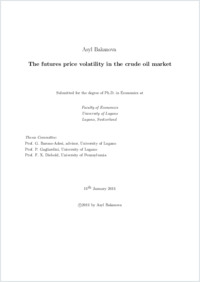The futures price volatility in the crude oil market
- Bakanova, Asyl
- Barone-Adesi, Giovanni (Degree supervisor)
-
11.01.2011
96 p
Thèse de doctorat: Università della Svizzera italiana, 2011 (jury note: magna cum laude)
Implied volatility
Crude oil futures
ARCH models
Volatility forecasting
Information
Range-based estimators
Model-free volatility
English
The main goal of this thesis is to present and evaluate different procedures for modeling and forecasting volatility, and examine the relative accuracy of these forecasts using data from the light, sweet crude oil futures market traded at New York Mercantile Exchange (NYMEX). First, we consider various volatility models and find that the models, which account for long memory, has the best forecasting performance over the longer horizons. We use the range-based volatility estimators, based on high, low, opening, and closing prices, as volatility proxies. Next, we apply the model-free methodology to extract implied volatility from prices of options on light, sweet crude oil futures and analyze its information content. Our results show that model-free implied volatility, although biased, has predictive power and it is an efficient measure of future realized volatility. We find that forecasts based on historical prices do not contain information that was not impounded in implied volatility. Finally, we estimate the variance risk premium in the crude oil futures market and analyze whether this risk premium is priced, and thus, causes implied volatility to be a biased forecast of future realized volatility. In line with previous evidence on equity indices and currencies, we show that the volatility risk premium in the crude oil futures market has been negative and time-varying.
- Language
-
- English
- Classification
- Economics
- License
-
License undefined
- Identifiers
-
- RERO DOC 29755
- URN urn:nbn:ch:rero-006-111046
- ARK ark:/12658/srd1318438
- Persistent URL
- https://n2t.net/ark:/12658/srd1318438
Statistics
Document views: 343
File downloads:
- Texte intégral: 276
